#petrus alamire
Text

Catherine of Aragon in the Alamire Choir Book by Petrus Alamire
#catherine of aragon#katherine of aragon#katharine of aragon#catalina de aragon#saint catherine of alexandria#renaissance history#tudor history#tudor england#tudor dynasty#tudor era#16th century#sixteenth century#illuminated manuscript#renaissance art#renaissance#the tudors#art#english history#northern renaissance#henry viii#the six wives of henry viii
110 notes
·
View notes
Video
Visited this cool exhibition last week. It’s a group of choral singers singing tunes by Petrus Alamire from the 16th century. Each singer had an individual speaker. If you stood in the middle you got them all singing at once from all angles. Pretty fucking special.
3 notes
·
View notes
Photo
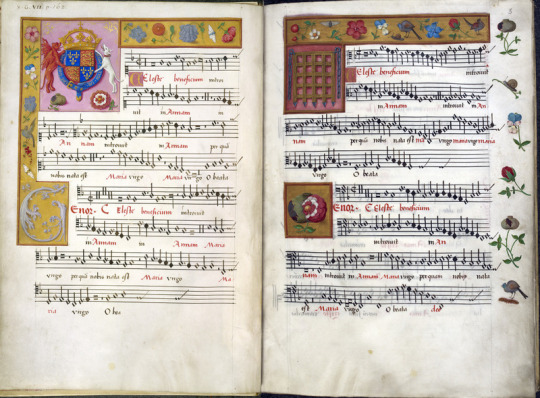
The Book of 28 motets
Petrus Alamire ( c. 1470 – 1536) was a German-Dutch man of many talents, a renowned merchant of manuscripts, a scribe, mining engineer, instrumentalist, composer, and diplomat carrying letters between humanists of the time such as Erasmus. His work as a musician also gave him access to Europe's royal courts. Alamire, resident of the Low Countries, for a short period worked as a spy in Henry VIII's service, keeping the king of England informed of the movements of Richard de la Pole, claimant to the English throne, who was living in exile in Metz. Pole was the son of Elizabeth of York, sister of King Edward IV of England, and was a constant thorn in Henry's side until he was killed at the Battle of Pavia in 1525.
According to Dr Skinner it is likely Alamire would have been recruited by Henry VIII's most trusted advisor Cardinal Thomas Wolsey. Wolsey would have identified Alamire's musical talents as a way to get him into Pole's court. Alamire's manuscripts had already found homes with King Philip I of Castile and the Holy Roman Emperor Charles V. As part of their diplomatic exchanges surrounding the Pole affair, Alamire is known to have given Henry a number of musical gifts. "Music was a perfect diplomatic gift... a perfect way to exchange information without drawing much suspicion."
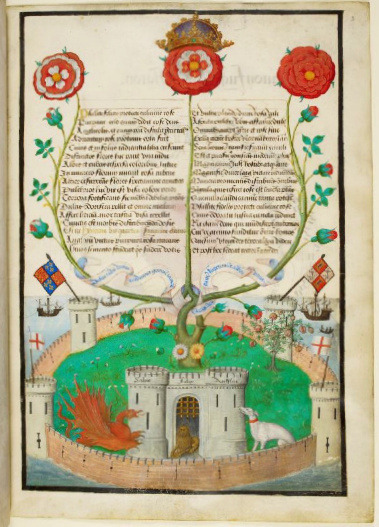
Petrus Alamire created a group of books sometime between 1510 and 1520, one of these honouring Henry VIII and Katherine of Aragon. The Book of 28 motets is certainly the most luxurious of the surviving diplomatic gifts to the Tudor court from the 16th century, and contains 28 Latin motets as well as six works on texts from Virgil’s Aeneid by the finest Continental composers of the age, including Josquin des Prez, Antoine de Févin, Jean Mouton, Heinrich Isaac, Pierre de la Rue; well over half the compositions are anonymous and most have never been performed in modern times. The choral works make reference to mourning and childbirth, reflecting the difficulties Henry had faced producing an heir, including the stillbirth of a daughter and the death of a seven-week-old son. His wife, Katherine of Aragon, had also endured several miscarriages. The book was given to Henry VIII in 1516 as one of the several musical gifts from Alamire to the Henry VIII or a diplomatic gift from Margaret of Austria at the end of Henry VIII s French campaign of June to October 1513.
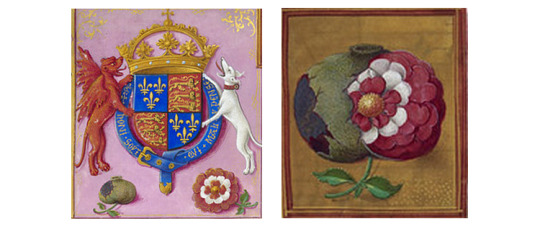
This was clearly a manuscript made specifically for the king of England: the marginal flora and fauna common to Flemish illumination are combined here with typical Tudor symbols. One miniature shows the dragon and the greyhound flanked by the Tudor rose and Katherine of Aragon’s pomegranate, the other with the rose and pomegranate joined as one.
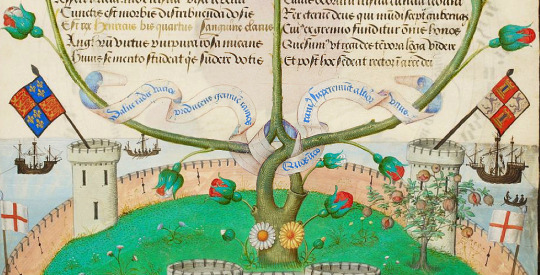
Katherine and Henry are represented by the banners of England and Castile flying from twin towers. Katherine’s device is visible on the right, a pomegranate bush bearing fruit under her banner. It’s a rather poignant reminder of what was once the great hope of Henry VIII’s reign, a blissfully happy union that ended in sadness.
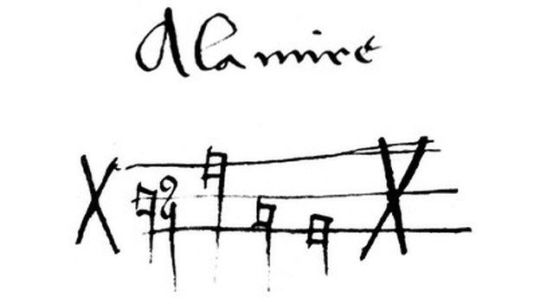
But unknown to the king, his spy had turned rogue. Travelling to Metz in France, Alamire visited Pole and became engaged as a counter-spy giving the traitor information about Henry's court and movements around his realm. "We know from letters which have survived to the king, but also to Richard de la Pole, that Alamire was passing information between the courts," said Dr Bell. Whether Alamire succeeded in providing potentially devastating information between his two employers is unknown. However, his employers soon began to distrust him. Alamire never returned to England after 1516 but, despite Alamire being discovered, Henry kept the manuscript. It now forms the backbone of the British Library's collections. For the past 500 years most of its music has been forgotten, but Dr Skinner and his choir, also called Alamire, recently recorded it for the album The Spy's Choirbook.
Sources:
http://www.bbc.com/news/uk-england-london-29693410
http://nerdalicious.com.au/books/royal-library-the-rose-and-pomegranate-henry-viii-and-katherine-of-aragon/
http://blogs.bl.uk/digitisedmanuscripts/2011/10/the-spys-choirbook.html
http://www.alamire.co.uk/press/spys-choirbook-released-october-2014
12 notes
·
View notes
Text
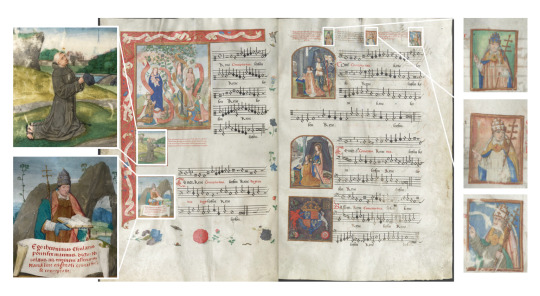
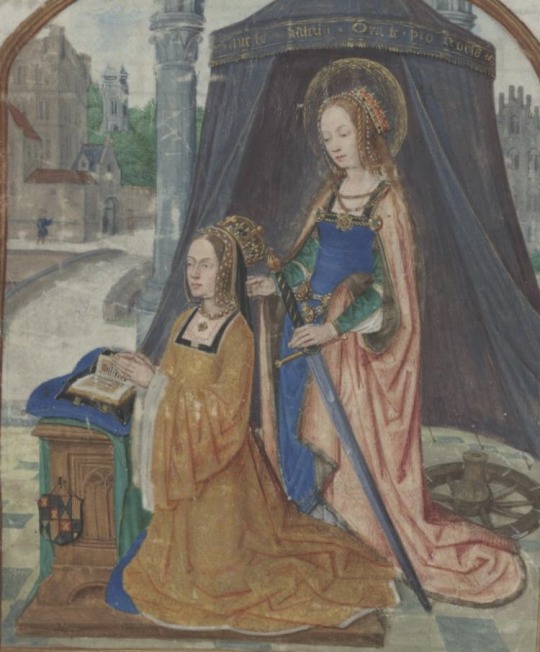

Queen Catherine of Aragon (with St. Catherine of Alexandria) and Henry VIII( with St. George) in a choir book by Petrus Alamire. The book was gifted to the King and Queen in 1513/18. Petrus Alamire was supposed to be a spy for Henry VIII, meant to watch Richard de la Pole, but he was actually a double agent who was loyal to de la Pole.
Sources:
https://thebrooklynarthistorian.com/2019/06/18/music-fit-for-a-king-or-two/amp/
https://www.sandiegoreader.com/news/2014/oct/09/classical-heard-first-time-500-years/
https://twitter.com/chloellene/status/1391376563883716613?s=20&t=6fuLxF3FUVEiSTBLJrrdkA (the tweet is where I found the close up image)
#catherine of aragon#katherine of aragon#henry viii#tudor history#the tudors#english history#tudor era#catalina de aragon#king henry viii#tudors#renaissance art#northern renaissance art#northern renaissance#renaissance#illuminated manuscript#medieval art#medieval#manuscript#art#tudor art#Netherlandish art#katharine of aragon
114 notes
·
View notes